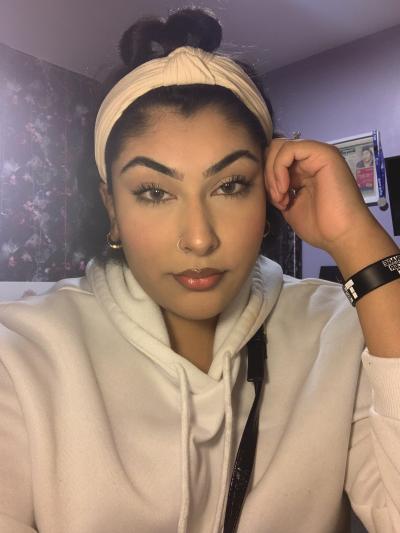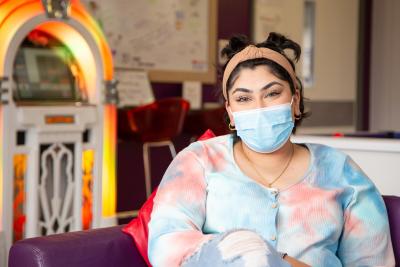I gave my best friend my passwords in case I didn’t make it through treatment
Mariam
After being diagnosed with cancer at 18, Mariam shares how her fear of dying had an impact on her mental health, where she was able to access help and support, and how that has changed her perspective on life.
Content warning: This story talks about fears of death and dying, and struggles with mental health.
Cancer is an emotive word. We hear so often from young people that the first thought that comes into their head when they’re diagnosed is ‘Does this mean I’m going to die?’
Facing this fear can feel overwhelming at any age, but especially for young people who have received a cancer diagnosis. And from stories like Mariam’s, we know that fears about death and dying can have a huge impact on your mental health and the people around you too.
Mariam was diagnosed with Hodgkin lymphoma aged 18 and was treated by Teenage Cancer Trust at Nottingham City Hospital. She finished her treatment in March 2021. Here, she shares her story:
The first time the thought of death ever crossed my mind was when I went for my ultrasound, before I’d even been diagnosed. I remember the radiographer immediately told me he suspected that the lymph nodes on my neck were cancer.
I broke down instantly and kept asking the same question. “Am I going to die?”
This fear was extremely overwhelming, especially experiencing this as an 18-year-old who had her birthday just around the corner.
The radiographer reassured me that with the correct treatment I’d be okay and be able to carry on like normal, but this reassurance was never enough.
When I was medically diagnosed and heard my prognosis, it still gave me doubts about whether I’d be one of the 5% who don’t make it through the five years post treatment. I asked my consultant, but I was in such a state of shock that I could only laugh about it.
Every time I got ill during treatment and ended up under hospital care, I’d be hysterical and seek reassurance from the nurses and doctors about whether I’d die, especially when I had high temperatures and severe pain.
This fear carried on for a long time until I was declared in remission, but the anxiety always loomed.
I’d begun to have panic attacks, where I’d question my own consciousness and panic that I’d actually died.
I never spoke about these fears to my parents but did to my best friend. I’d even given her my social media passwords when I started treatment “just in case.”
I had to mourn the death of my pre-cancer self in order to move on and accept my new self.
These fears still loom but have a direct correlation with my anxiety. If I’m experiencing a bad day I’ll worry that my cancer will come back and I will die, but with the right support system it’s become easier to disregard these thoughts. My therapist and survivorship nurse Laura helped me tackle these thoughts and feelings and channel them into positive thoughts.
This fear impacted my life and how I treated others around me. I always try my absolute best to show everyone kindness and forgiveness. It made me value my family so much and having them as a support system.
It made me less materialistic and helped me focus on the little sentimental things in my life, and having a ‘second chance’ essentially.
It strengthened my faith and my spirituality, and I appreciate that I’m still here doing the things I always wished I’d do. I now enjoy things like being able to see friends, go on walks, seeing my extended family members; it was all something I took for granted before treatment but my family, Laura and my best friend are the reason I’ve been able to overcome these thoughts.
Further support
Even though most young people with cancer are given a positive prognosis and there are a range of different treatment options available, we mustn’t forget that sadly not every young person makes it through cancer.
Finding out your treatment won’t work, and that the hospital team won’t be able to get you better, can be a shock. If this has happened to you or someone close to you, you might find this page helpful: What happens if your cancer treatment stops working
Your clinical team, Teenage Cancer Trust Nurse or Youth Support Coordinator will always be happy to talk to you and your family about any worries you have throughout your experience of cancer. They’ll do whatever they can to help you, which may include referring you to specialist support.
If they’re not available, or if you’d rather speak to someone else, there are lots of places you can get support or access urgent help in times of crisis – please visit: Urgent help



